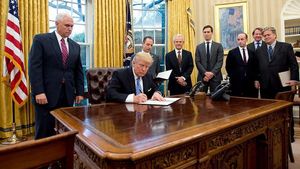The recent vote in Germany’s Bundestag has sparked intense debates and fears, as the traditional boundaries separating mainstream political parties from the far-right Alternative for Germany (AfD) appear to have crumbled. The vote, which occurred on February 1, 2025, introduced significant shifts, with the conservative Christian Democratic Union (CDU) and its sister party, the Christian Social Union (CSU), taking steps toward collaborating with the AfD on immigration policies.
Leading the charge was Friedrich Merz, CDU leader, who proposed a five-point plan aimed at tightening immigration systems across the nation. Among the most controversial elements of the proposal was the call to reinstate border controls and to turn back migrants lacking permission to reside in Germany. Despite concerns over potential conflicts with European law, Merz was determined to put his plan to the vote, even if it required support from the AfD. This collaboration proved successful, resulting in a narrow vote tally of 348 to 345.
The results marked not only a pivotal moment but also signaled the dismantling of the 'firewall'—an unwritten agreement among Germany’s major parties to avoid any cooperation with the far-right AfD. Until this moment, leaders like Merz had steadfastly refused to engage with the AfD on both local and national levels. This vote prompted jubilant responses from the AfD, who hailed it as a turning point, celebrating what they termed the 'fall of the firewall' and proclaiming it a great day for democracy.
Responses from the left were starkly different. Outgoing Chancellor Olaf Scholz expressed outrage, accusing Merz of violating longstanding commitments to keep the AfD marginalized. Scholz labeled this decision as diverging from the traditions upheld by former chancellors including the likes of Angela Merkel, who had traditionally avoided any political entanglement with right-wing factions.
Merkel herself criticized Merz's actions, stating, "For the first time in history to achieve majorities together with the AfD is unacceptable." This sentiment was echoed across the political spectrum, with members of the Green party calling it “a dark day for our democracy.” They and the Left party responded vigorously, with calls to action and spontaneous protests erupting nationwide.
Specific protests drew thousands of demonstrators, with gatherings occurring not just in major cities like Cologne but also throughout Essen and Aachen. Protestors held signs reading, "No Merz in March," referencing the upcoming parliamentary elections set for February 23, 2025. This reflects not just opposition to Merz and his party but also broader concerns aboutAfD's rising influence.
While the vote was non-binding, it symbolizes significant political shifts within Germany’s political atmosphere. Leaders are acutely aware of the ramifications as the election approaches, particularly following the collapse of Germany’s governing coalition last November. The coalition of SPD, Greens, and FDP fell apart over fiscal disputes, which has left the political field wide open for the upcoming elections.
Initial polling indicates CDU/CSU holding the lead, with the AfD coming second. The CDU will require coalition partners for any future governing team; yet the historic ties to the AfD complicate potential alliances. Observers are noting how Merz's maneuvering might alienate moderate voters who have historically supported CDU. There is now fear of political backlash, especially as recent violent events involving migrants have heightened public scrutiny on immigration and asylum policies.
This Bundestag vote has fundraising and campaigning threads intertwined, polarizing debates around migration, asylum, and security—the themes dominating voters’ concerns as they head to the polls. The CDU risks losing moderate supporters enticed by challenging stances on immigration amid fears of bubbling far-right sentiment. Politically, the question lingers: has the far-right been strengthened or its influence contained through mainstream accommodation?
Critics point to other European instances, like Austria’s ÖVP, which had originally ruled out coalitions with far-right entities only to shift positions when negotiations with established parties proved unsuccessful. Merz claims he will not follow this path, but trust issues arise as turbulence grows around his leadership. The German public is now increasingly aware of the shifting alliances and the tumultuous political implications such change could hold for the future.
Germany's response to these developments is being watched closely by its European neighbors who remain apprehensive about the uncomfortable political climate, especially when coupled with current geopolitical pressures. The vote's outcome could tip the scale, potentially inviting relaxed adherence to EU laws on immigration—all as the nation seeks to carve out its political direction leading up to the upcoming elections.
With polarizing debates around immigration taking center stage, the dynamics of these discussions will shape not only the campaign trails leading up to February 23 but also the political future of Germany amid complex European unity discussions.



